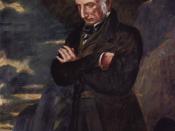"Lines Written in Early Spring," by William Wordsworth, sets the tone within the title. The thought of early spring brings new life and harmony to the mind of the reader. A vision of Wordsworth sitting in a open field, observing the flowers budding and bunnies hopping around comes to the reader's mind. He "heard a thousand blended notes" of birds singing and the world blooming around him, thoughts of Bambi are brought to mind. Spring, for me, creates a feeling of joy, and I think it is the best of the four seasons. A new start for all life to live as one and get along.
The next two lines could be quite confusing after the first reading. A "sweet mood" causes his "pleasant thoughts/ [to] bring sad thoughts to mind." At first, I wondered how a sweet mood and pleasant thoughts could possibly bring sad thoughts, but when I thought about it, I realized that sometimes when you're at your happiest moment, sad memories and ponderings come to mind.
Wordsworth continues explaining that his soul was linked to Nature and her works through the wonder of spring. The image of the human soul running through him brings an apparent depth to the poem, turning the theme from spring to a more intimate perspective of man. "And much it grieved my heart to think/ what man has made of man." The lines question a topic that most people will never fathom in their lifetimes. He describes his grieving over the topic of man's world.
To grieve, as defined by Dictionary.com, means "to be in pain of mind on account of an evil." This definition describes exactly how Wordsworth feels about the evil that mankind has made of his world.
Lines 9 and 10 continue to depict the setting that...


